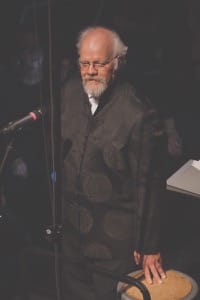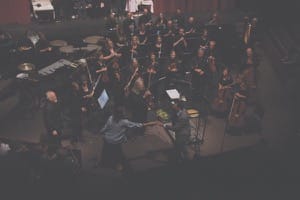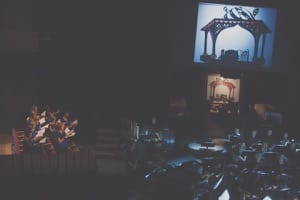For the first time since the Iranian Revolution, an Iranian composer living in Iran was commissioned by an American orchestra—led by Warren Friesen ’75.

For Warren Friesen ’75, St. Peter, Minnesota, it’s always been about the music.
Music has led him across more than one frontier in his life—including a bridge between two countries that have long bristled at each other over a nuclear divide.
Rooted in North Newton: Life as a campus kid
Warren started life as a Bethel campus kid. His father, William Friesen, was managing the college farm and teaching agriculture and botany classes when Warren was born. After a brief hiatus in Henderson, Nebraska, the family settled in North Newton, where Bill worked briefly in the Bethel maintenance department before becoming business manager for the General Conference Mennonite Church.
“Growing up in North Newton was a pretty rich musical experience,” Warren says, “well beyond what most people would think possible in a town of 16,000 in the middle of Kansas. We had a good orchestra program [in the Newton public schools], and that’s saying something when one considers that very few towns of this size anywhere in America, then or now, managed to field an orchestra program at all.

“Throughout [middle] and high school, I also played with the Wichita Youth Symphony and the Newton Civic Orchestra, now known as the Newton Mid-Kansas Symphony Orchestra. Even as a high school student, I was engaged to play viola for many Bethel and Hesston College events—operas, oratorios and so on. I even played for a ‘mariachi Mass’ at Our Lady of Guadalupe [Catholic Church in Newton].
“In my senior year of high school, I also studied piano under Bethel’s J. Harold Moyer ’49, who was a fine composer and introduced me to modern piano literature.”
In addition to his extensive musical involvement, Warren was an active student leader at Newton High School. But when it came time to go to college, he says, “I needed to get out of my little pond.”
So he started not at Bethel but Earlham, a small Quaker college in Richmond, Indiana.
“I transferred to Bethel in the middle of my sophomore year,” he says. Surprisingly, he adds, “It really was not my intention to major in music—I wanted to prepare to enter medical college.
“But I just always found the practice room and concert stage a whole lot more inviting than the science [building]. I eventually quit fighting it and went for music.”
“[Being at Bethel] was unlike going to a conservatory,” he says. “There was so much self-direction involved, and a broad [liberal-arts] education.
“The other thing that was really important at Bethel was my fellow students. We pushed each other, and made each other better.”
Beyond Bethel: Taking risks

Warren himself went on to study viola and conducting at Rice University in Houston, where he earned a Master of Music degree in 1984. He was hired to play in the Duluth (Minnesota) Superior Symphony Orchestra and direct their youth orchestras, and eventually became assistant conductor of the DSSO.
In 1986, he started the Duluth-based Lake Superior Chamber Orchestra.
The LSCO was born because “professional musicians in the area wanted a quality ensemble to perform with in the summer months. But I also started this orchestra for selfish reasons, because I wanted to build this kind of an orchestra.”
By which he means one willing to take some risks.
“One of the things that really concerns me about the current orchestral scene in America is the extent to which programming is centered almost exclusively on ‘the canon,’” he says, “the music of dead, white, European men.
“I love the music of Bach, Beethoven, Brahms, Mozart and so on, and their works will always find a place in my programs. But the unfortunate fact is that if we perform only those works, the orchestra is in danger of becoming a museum—or worse, a mausoleum.
“There are so many composers all over the world whose voices need to be heard as well.”
The LSCO has earned national recognition in recent years from the American Symphony Orchestra League by winning four ASCAP Awards “For the Adventuresome Programming of Contemporary Music.” It also garnered two performance grants in the past two years from the Women’s Philharmonic Advocacy for the performance of works by female composers.
For Warren, “adventuresome programming” can be summed up as: “Music of living composers. Music of American composers. Neglected music of the past. Music by composers of the Third World.”
Building bridges, connecting continents
In late March 2014, Warren found himself sitting a five-night vigil at the bedside of his dying father in North Newton. He had brought his laptop along and spent a lot of that time listening to music and putting finishing touches on the four-concert Lake Superior Chamber Orchestra program.
For the first one, he was 6-8 minutes short. Given the other works on the program, he needed something for piano and strings.
“So I literally went into YouTube and put in ‘strings and piano’ [to] see what came up.” Thousands of pieces did. After listening to snippets of several dozen, he came across “Stained Glass” by a composer he’d never heard of, Hooshyar Khayam.
“At this point, I didn’t even know that Hooshyar was living in Tehran. I liked [‘Stained Glass’] on first hearing and every time I played it—and I played it a lot—I liked it even more.”
The next day, he e-mailed the composer to ask about using it. The “almost immediate” response was “Yes.” Warren and LSCO gave the U.S. premiere of Khayam’s “Stained Glass,” July 3, 2014.
In a later e-mail to Hooshyar, Warren wrote, “I think I would have liked ‘Stained Glass’ apart from this experience with my dad’s passing—although I doubt I would have chanced on it but for the hours suddenly at my disposal. In any case, the piece will always be attached in my mind with that experience.
“Who knows? Perhaps he even heard it on some level during those hours of his dying [March 26]. They say that the auditory sense is the last to go. I like to think that your music may have been a comfort to him in his passing. It was a comfort to me.”
Continued collaborations: Finding a common language
Hooshyar was impressed with the way the LSCO played “Stained Glass.” He told a Minnesota Public Radio reporter, “I was very much moved by the extreme power of the musicians in the American orchestra, who could in fact play the Persian rhythms with that accuracy and that perfection.”
“Certainly I see this kind of adventuresome programming as ‘doing justice.’ That was something that was inculcated in me through my Mennonite experience and education—home, church, teachers, Bethel.”
But more than that, despite a 25-year age difference, Warren and Hooshyar connected. And so, even as their respective countries were in the midst of high-stakes negotiations over Iran’s access to nuclear materials and whether to lift long-standing economic sanctions, Warren commissioned Hooshyar to write an original piece for the LSCO that incorporated the puppet artistry he intended to include in his summer 2015 program.
The result was “Kalileh,” a 40-minute work that marks the first time since the Iranian Revolution in 1979 (when Hooshyar, incidentally, was a year old) that an Iranian composer living in Iran has been commissioned by an American orchestra.
“Kalileh” tells a classic Persian fable adapted from an 8th-century story, which dates back over a thousand years earlier to India. The title character is a jackal, an archetypal trickster, who wants to be as beautiful as the peacock.
“Kalileh” made its world premiere July 23, 2015, in Duluth, with shadow puppetry by the Magic Smelt Puppet Troupe and the voices of the Lake Superior Youth Chorus.
Neither Warren nor Hooshyar talks much about the politics, but they didn’t ignore the importance of their cultural exchange, either. The BBC got wind of it and was on hand when Hooshyar came to Duluth as the LSCO prepared for the premiere, producing a piece for BBC Persian Television that was seen by up to 20 million people throughout the Middle East.
“I’m always searching for sort of a higher meaning than only notes to listen to,” Hooshyar told the Duluth News Tribune. “The most important ingredient of this collaboration is the fact that it’s happening between two countries who have had years of misunderstanding and years of conflict.”
He adds, “We try … to find a common language which can be ideally appreciated and understood by Iranians and non-Iranians alike. … I am hopeful and am looking forward, as I have seen the artists here are looking forward, to a complete understanding and appreciation of each other’s arts and culture.”
And the collaboration is not finished. Hooshyar is composing “Rhapsody in Turquoise” (a color associated with Persia), a companion piece to George Gershwin’s “Rhapsody in Blue,” to be premiered by the LSCO in 2017.
“Music really is the international language,” Warren says. “And there are composers … all over the world. The orchestra—this amazing artistic ensemble—may have had its birth in Europe but it has been embraced all over the earth. Last year, I started the concert season with a concert entitled ‘Around the World in 80 Minutes,’ in which we represented music from all six habitable continents. It was exhilarating.
“Performing the premiere of ‘Kalileh’ is one of the most important events of my career. Here were two countries almost ready to take up arms against each other and two artists able to connect in such a profound way.”